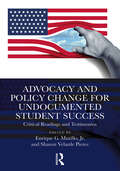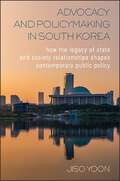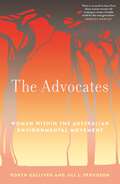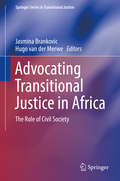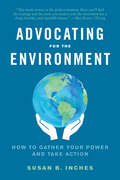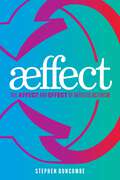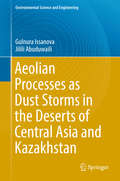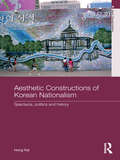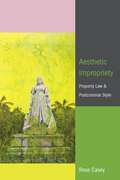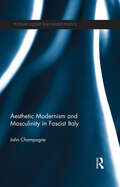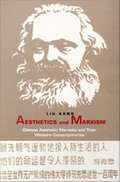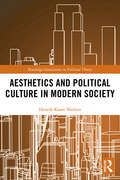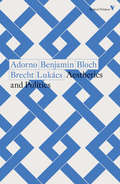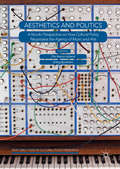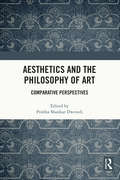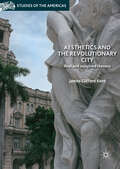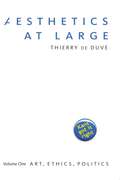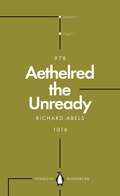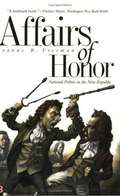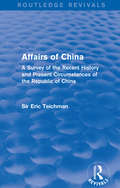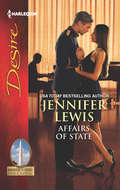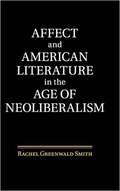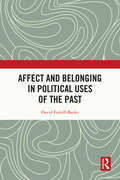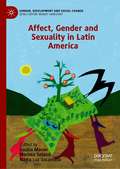- Table View
- List View
Advocacy and Policy Change for Undocumented Student Success: Critical Readings and Testimonios
by Enrique G. Murillo Sharon Velarde PierceAdvocacy and Policy Change for Undocumented Student Success is a compelling exploration of the undocumented student experience in America, offering a deep dive into the advocacy, education, and systemic challenges faced by undocumented communities.Compiling the most significant work in the field in terms of its contributions to research and professional practice, this volume uncovers the historical struggles and triumphs of undocumented students and their families in their quest for educational access and equity. From pivotal legal milestones to personal narratives of resilience and adversity, this collection paints a comprehensive picture of the ongoing battle against legal and societal barriers. It delves into the mental health impacts of living undocumented and presents innovative strategies and policy reforms aimed at bridging the gap between harsh realities and hopeful aspirations. A clarion call to action, this volume is an invitation to join the fight for a more equitable and inclusive society, recognizing the vital contributions of undocumented individuals and advocating for systemic change.Advocacy and Policy Change for Undocumented Student Success is a must-have resource for graduate students and researchers in Educational Leadership and Policy, Multicultural Education, and Teacher Education. It will also be an important reading for educational leaders, teachers, counselors, administrators, and organizations that share a common interest in and commitment to the educational issues that impact undocumented students and their families.
Advocacy and Policymaking in South Korea: How the Legacy of State and Society Relationships Shapes Contemporary Public Policy
by Jiso YoonWho dominates in the contemporary policy process in South Korea? How do policy advocates engage in advocacy activities to exercise influence? Building on existing theories of state, society, and public policies in democracies, Advocacy and Policymaking in South Korea argues that the legacy of state-society relationships explains who influences and how in South Korean policymaking. The state-society relationship has been a popular framework to explain democratic transition and consolidation. Yet, few studies to date extend the approach to explain advocacy and policymaking across political systems. Jiso Yoon shows the relevance of the framework in explaining advocacy and policymaking today with empirical evidence drawn from the contemporary policy process in South Korea. In addition, she compares policy communities across new and old democracies, such as South Korea and the United States. In this regard, the comparative analysis included in the book sets an important research example for students of comparative public policy to follow.
Advocates: Women within the Australian Environmental Movement
by Robyn Gulliver Jill L FergusonFrom boardrooms to blockade camps, from the lush East Gippsland forests to the golden Ningaloo Reef, the fight against environmental destruction takes place in many spaces. The Advocates tells the inside story of nine extraordinary women within the Australian environmental movement and the behind-the-scenes efforts that have helped power advocacy across Australia. Over the past fifty years these advocates have held corporations to account, cleaned up toxic waste in their own backyards, and returned biodiversity to our forests. They are not always on the frontlines of the fight or the front pages of the news, but their relentless commitment to making change is both moving and inspiring. In often unseen and unacknowledged ways these women have educated, agitated and pioneered new approaches to the many crises in the Australian environment. Told through richly detailed interviews, these stories get to the heart of why these women have dedicated their lives to environmental causes and the different ways they have persevered. The Advocates shines a light on nine women's tireless commitment to change, and what it means to be an Australian environmental advocate. These stories will inspire the next generation to find a place in that vital fight.
Advocating Transitional Justice in Africa: The Role of Civil Society (Springer Series in Transitional Justice)
by Jasmina Brankovic Hugo van der MerweThis volume documents and analyses the strategies used by African civil society organisations to lobby for and enact transitional justice measures in their countries. The book offers local practitioners and African scholars space to reflect on the development and effectiveness of strategies in promoting transitional justice, as well as to identify the theoretical and contextual influences on transitional justice work. Most importantly, it presents lessons and best practices for advocating transitional justice. This edited volume fills a significant gap by providing an up-to-date regional African perspective on transitional justice in the form of a compilation of country-specific and thematic analyses of agenda-setting and lobbying efforts. It also offers insights into the state-civil society relationship on the continent. While including some historical perspective, the book chapters provide fresh and up-to-date insights into ongoing transitional justice efforts that are key to defining the future of how the field is understood in theory and in practice.
Advocating for the Environment: How to Gather Your Power and Take Action
by Susan InchesAn accessible, solutions-oriented guide for addressing the earth's environmental crisis and enacting meaningful changeWhat can we as ordinary citizens do about climate change?" While countless environmental books focus on the causes of our current crisis, Advocating for the Environment is one of the first to focus on advocacy and policy-based solutions, arming readers with the tools they need to take action and enact change. In Part I, environmental policy expert Susan Inches discusses storytelling, empathy, mindset, and how effective communication can help us collaborate with others, even those with opposing views. Part II focuses on practical skills like coalition building, media relations, communication strategy, and navigating political and bureaucratic obstacles that block large-scale legislation. The book also includes case studies, research, and templates to deepen learning. Professors and teachers, students, legislators, environmental clubs, and church groups will also find useful ideas and strategies on every page.
Aeffect: The Affect and Effect of Artistic Activism
by Stephen DuncombeThe first book to seriously identify how artistic activism works and how to make it work betterThe past decade has seen an explosion in the hybrid practice of “artistic activism,” as artists have turned toward activism to make their work more socially impactful and activists have adopted techniques and perspectives from the arts to make their interventions more creative. Yet questions haunt the practice: Does artistic activism work aesthetically? Does it work politically? And what does “working” even mean when one combines art and activism? In Æffect, author Stephen Duncombe sets out to address these questions at the heart of the field of artistic activism.Written by the co-founder and current Research Director of the internationally recognized Center for Artistic Activism, Æffect draws on Duncombe’s more than twenty-five years of experience in the field and one hundred in-depth interviews with artistic activists worldwide. More than a mere academic exercise, the theory, research, and tools in this book lay the groundwork for artistic activists to evaluate and strengthen their practice and to create better projects. The exploration of good artistic activism is grounded in three sets of concerns. 1) Change: Upon what theories of change is artistic activism based? 2) Intention: What do we hope and expect artistic activism to do, and how does it do this? 3) Evaluation: What actually happens as the result of an artistic activist intervention? Can it be measured?Æffect is rich with examples that demonstrate successful artistic activism, including Undocubus, an old bus painted “No Fear” across its side that was driven cross-country by a group of undocumented immigrant activists; Journal Rappé, a video show created by Senegalese rappers who created long-form investigative reports by rapping the current news in French and Wolof; and War on Smog, a staged a public performance piece by artistic activists in the city of Chongqing in Southwest China. Scannable QR codes are included to provide tools that help readers assess the æffect of their artistic activism.
Aeolian proceses as Dust Storms in the Deserts of Central Asia and Kazakhstan (Environmental Science and Engineering)
by Gulnura Issanova Jilili AbuduwailiThis book highlights the aeolian processes in the desert zone of Kazakhstan and analyzes the current status of dust and sand storms in Central Asia and Kazakhstan. It also highlights the analyses, dynamics and long-term observations of storms on the basis of numerous cartographic materials and satellite images. Dust/sand storms are a common and important phenomenon in the arid and semi-arid regions of Kazakhstan, especially in its southern parts, where areas are covered by a great variety of deserts and offer a significant source of mineral and salt aerosols. The deserts of Kazakhstan mostly cover lowlands and extend from the eastern coast of the Caspian Sea to the piedmonts of the Tien-Shan Mountain. In Kazakhstan, desertification processes due to wind erosion in the form of dust/sand storms were observed in semi-desert and desert landscapes.
Aesthetic Constructions of Korean Nationalism: Spectacle, Politics and History (Asia's Transformations)
by Hong KalWhile most studies on Korean nationalism centre on textual analysis, Aesthetic Constructions of Korean Nationalism offers a different approach. It looks at expositions, museums and the urban built environment at particular moments in both colonial and postcolonial eras and analyses their discursive relations in the construction of Korean nationalism. By linking concepts of visual spectacle, urban space and governmentality, this book explores how such notions made the nation imaginable to the public in both the past and the present; how they represented a new modality of seeing for the state and contributed to the shaping of collective identities in colonial and postcolonial Korea. The author further examines how their different modes were associated with the change in governmentality in Korea. In addressing these questions, the book interprets the politics behind the culture of displays and shows both the continuity and the transformation of spectacles as a governing technology in twentieth-century Korea. Aesthetic Constructions of Korean Nationalism is a significant contribution to a study of the politics of visual culture in colonial and postcolonial Korea. The book will be of interest to students and scholars of Korean Studies, Culture and Heritage Studies and Asian Studies.
Aesthetic Impropriety: Property Law and Postcolonial Style
by Rose CaseyAcross Africa, Asia, and the Americas, colonial Britain’s property laws are in the process of being transformed. Aesthetic Impropriety analyzes vanguard legal actions and literary innovations to reveal contemporary reforms to property law that are undoing law’s colonial legacies. Casey traces precise legal histories across distinct jurisdictions throughout the anglophone world, revealing the connection between land law and petroleum extraction in the Niger Delta, inheritance and divorce laws and gender inequality in India, intellectual property law and Indigenous dispossession in South Africa, and admiralty law and racialized non-personhood in the English Atlantic. In response to these manifold forms of dispossession, significant reforms are underway, including through common law suits, statutory reform, and proposed changes to legal doctrine. Casey develops the concept of aesthetic impropriety to identify shared structures of thought across legal and literary venues. She shows that writers of poetry and prose are also transforming harmful property laws: in Nigeria, Ben Okri and Chigozie Obioma have articulated symbiotic ecological relationships that are also evidenced in recent actions against petroleum companies; in India, Arundhati Roy’s challenge to divorce laws has preempted similar attempts at reform in Parliament; in South Africa, Zoë Wicomb theorized protections for Indigenous modes of creative production nineteen years before they were signed into law; and in the Americas, M. NourbeSe Philip has proposed a novel method of achieving justice for the one hundred fifty enslaved people who were killed in the 1781 Zong massacre. Aesthetic Impropriety makes a convincing case for literature’s generative capacities and registers the enduring significance of the postcolonial as a necessary framework for understanding globalized inequality in the twenty-first century. By analyzing shared legal and aesthetic transformations, Aesthetic Impropriety argues that law and literature play vital roles in creating anticolonial world orders.
Aesthetic Modernism and Masculinity in Fascist Italy (Popular Culture and World Politics)
by John ChampagneAesthetic Modernism and Masculinity in Fascist Italy is an interdisciplinary historical re-reading of a series of representative texts that complicate our current understanding of the portrayal of masculinity in the Italian fascist era. Examining paintings, films, music and literature in light of some of the ideological and material contradictions that animated the regime, it argues that fascist masculinity was itself highly contradictory. It brings to the fore works that have tended to be under-studied, and argues that, while fascist inclusive strategies of patronage worked to bind artists to the regime, an official policy of non-interference may inadvertently have opened up a space whereby the arts expressed a more complicated and contestatory view of masculinity than the one proffered by kitsch photos of a bare-chested Mussolini skiing. Champagne seeks to evaluate how the aesthetic analysis of the artefacts explored offer a more sophisticated and nuanced understanding of what world politics is, what is at stake when something – like masculinity – is rendered as being an element of world politics, and how such an understanding differs from more orthodox ‘cultural’ analyses common to international relations. Providing a significant contribution to understandings of representations of masculinities in modernist art, this work will be of great interest to students and scholars of gender studies, queer studies, political science, Italian studies and art history.
Aesthetic Perceptions of Urban Environments (Interventions)
by Arundhati VirmaniTo what extent do urban dwellers relate to their lived and imagined environment through aesthetic perceptions, and aspirations? This book approaches experiences of urban aesthetics not as an established framework, defined by imposed norms or legislations, but as the result of a continuous reflexive and proactive gaze, a complex and deep engagement of the mind, body and sensibilities. It uses empirical studies ranging from China, India to Western Europe. Three axes are privileged. The first considers urban everyday aesthetic experiences in the long-term as a historical production, from medieval Italy to a future imagined by science fiction. The second examines the impact of aestheticizing everyday material realities in neighbourhoods, and the tensions and conflicts these engender around urban commons. Finally, the third axis considers these relationships as aesthetic inequalities, exacerbated in a new age of urban development. The book combines local and transnational scales with an interdisciplinary approach, bringing together historians, sociologists, cultural geographers, anthropologists, architects, and contemporary art curators. They illustrate the importance of combining different social science methods and functional perspectives to study such complex social and cultural realities as cities. This book will be of interest to students, scholars and practitioners of humanities and social sciences, cultural and urban studies, architecture and political geography.
Aesthetics and Marxism: Chinese Aesthetic Marxists and Their Western Contemporaries
by Liu KangAlthough Chinese Marxism--primarily represented by Maoism--is generally seen by Western intellectuals as monolithic, Liu Kang argues that its practices and projects are as diverse as those in Western Marxism, particularly in the area of aesthetics. In this comparative study of European and Chinese Marxist traditions, Liu reveals the extent to which Chinese Marxists incorporate ideas about aesthetics and culture in their theories and practices. In doing so, he constructs a wholly new understanding of Chinese Marxism. Far from being secondary considerations in Chinese Marxism, aesthetics and culture are in fact principal concerns. In this respect, such Marxists are similar to their Western counterparts, although Europeans have had little understanding of the Chinese experience. Liu traces the genealogy of aesthetic discourse in both modern China and the West since the era of classical German thought, showing where conceptual modifications and divergences have occurred in the two traditions. He examines the work of Mao Zedong, Lu Xun, Li Zehou, Qu Qiubai, and others in China, and from the West he discusses Kant, Schiller, Schopenhauer, and Marxist theorists including Horkheimer, Adorno, Benjamin, and Marcuse. While stressing the diversity of Marxist positions within China as well as in the West, Liu explains how ideas of culture and aesthetics have offered a constructive vision for a postrevolutionary society and have affected a wide field of issues involving the problems of modernity. Forcefully argued and theoretically sophisticated, this book will appeal to students and scholars of contemporary Marxism, cultural studies, aesthetics, and modern Chinese culture, politics, and ideology.
Aesthetics and Political Culture in Modern Society (Routledge Innovations in Political Theory)
by Henrik Kaare NielsenDo aesthetic appeals to senses and emotions in political debate necessarily marginalise political reason and reduce citizens to consumers – thus dangerously undermining democracy? Or is sensuous-emotional engagement, on the contrary, a basic fact of the political process and a crucial precondition for revitalising democracy? Aesthetics and Political Culture in Modern Society investigates the current interrelationship between aesthetic practice and political practice in Western democracies, focusing on its impact on democratic political culture. Henrik Kaare Nielsen argues that aesthetic interventions in the political process do not by definition undermine politics’ content of reason. Instead, a differentiation must be made between a multiplicity of aesthetic forms of intervention – some of which tend to weaken the political judgement of citizens while other forms tend to stimulate competent judgement. This book will be of interest to scholars in the fields of political science, sociology, media studies, and cultural studies.
Aesthetics and Politics (Radical Thinkers)
by Walter Benjamin Theodor Adorno Georg Lukacs Bertolt Brecht Ernst BlochNo other country and no other period has produced a tradition of major aesthetic debate to compare with that which unfolded in German culture from the 1930s to the 1950s. In Aesthetics and Politics the key texts of the great Marxist controversies over literature and art during these years are assembled in a single volume. They do not form a disparate collection but a continuous, interlinked debate between thinkers who have become giants of twentieth-century intellectual history.
Aesthetics and Politics: A Nordic Perspective on How Cultural Policy Negotiates the Agency of Music and Arts (New Directions in Cultural Policy Research)
by Ole Marius Hylland Erling BjurströmThrough comparative and integrated case studies, this book demonstrates how aesthetics becomes politics in cultural policy. Contributors from Norway, Sweden and the UK analyse exactly what happens when art is considered relevant for societal development, at both a practical and theoretical level. Cultural policy is seen here as a mechanism for translating values, that through organized and practical aesthetical judgement lend different forms of agency to the arts. What happens when aesthetical value is reinterpreted as political value? What kinds of negotiations take place at a cultural policy ground level when values are translated and reinterpreted? By addressing these questions, the editors present an original collection that effectively centralises and investigates the role of aesthetics in cultural policy research.
Aesthetics and the Philosophy of Art: Comparative Perspectives
by Prabha Shankar DwivediThis volume brings together the finest research on aesthetics and the philosophy of art by stalwart critics and leading scholars in the field. It discusses various themes, such as the idea of aesthetic perception, the nature of aesthetic experience, attitude theory, the relation of art to morality, representation in art, and the association of aesthetics with language studies in the Indian tradition. It deliberates over the theories and views of Aristotle, Freud, Plato, Immanuel Kant, T. S. Eliot, George Dickie, Leo Tolstoy, R. G. Collingwood, Michael H. Mitias, Monroe C. Beardsley, and Abhinavagupta, among others. The book offers a comparative perspective on Indian and Western approaches to the study of art and aesthetics and enables readers to appreciate the similarities and differences between the conceptions of aesthetics and philosophy of art on a comparative scale detailing various aspects of both. The first of its kind, this key text will be useful for scholars and researchers of arts and aesthetics, philosophy of art, cultural studies, comparative literature, and philosophy in general. It will also appeal to general readers interested in the philosophy of art.
Aesthetics and the Revolutionary City: Real and Imagined Havana (Studies of the Americas)
by James Clifford KentAesthetics and the Revolutionary City engages in alternative ways of reading foreign visual representations of Havana through analysis of advertising images, documentary films, and photographic texts. It explores key narratives relating to the projection of different Havana imaginaries and focuses on a range of themes including: pre-revolutionary Cuba; the dream of revolution; and the metaphor of the city “frozen-in-time.” The book also synthesizes contemporary debates regarding the notion of Havana as a real and imagined city space and fleshes out its theoretical insights with a series of stand-alone, important case studies linked to the representation of the Cuban capital in the Western imaginary. The interpretations in the book bring into focus a range of critical historical moments in Cuban history (including the Cuban Revolution and the “Special Period”) and consider the ways in which they have been projected in advertising, documentary film and photography outside the island.
Aesthetics at Large: Volume 1: Art, Ethics, Politics (Art, Ethics, Politics)
by Thierry de DuveImmanuel Kant’s Critique of Judgment, Thierry de Duve argues in the first volume of Aesthetics at Large, is as relevant to the appreciation of art today as it was to the enjoyment of beautiful nature in 1790. Going against the grain of all aesthetic theories situated in the Hegelian tradition, this provocative thesis, which already guided de Duve’s groundbreaking book Kant After Duchamp (1996), is here pursued in order to demonstrate that far from confining aesthetics to a stifling formalism isolated from all worldly concerns, Kant’s guidance urgently opens the understanding of art onto ethics and politics. Central to de Duve’s re-reading of the Critique of Judgment is Kant’s idea of sensus communis, ultimately interpreted as the mere yet necessary idea that human beings are capable of living in peace with one another. De Duve pushes Kant’s skepticism to its limits by submitting the idea of sensus communis to various tests leading to questions such as: Do artists speak on behalf of all of us? Is art the transcendental ground of democracy? Or, Was Adorno right when he claimed that no poetry could be written after Auschwitz? Loaded with de Duve’s trademark blend of wit and erudition and written without jargon, these essays radically renew current approaches to some of the most burning issues raised by modern and contemporary art. They are indispensable reading for anyone with a deep interest in art, art history, or philosophical aesthetics.
Aethelred the Unready: The Failed King (Penguin Monarchs)
by Richard Abels'Æthelred's reign of nearly thirty-eight years was the longest of any Anglo-Saxon ruler. If he had died in AD 1000, history would have remembered him more kindly'Few monarchs of the Middle Ages have had a worse popular reputation than Æthelred II, 'the Unready', remembered as the king who lost England to Viking invaders. But, as Richard Abels shows, the failure to defend his realm was not entirely his alone. Æthelred was in many ways an innovative ruler but one whose challenges - a divided court, a fragile nascent kingdom, a voracious, hydra-headed enemy - were ultimately too great to overcome.
Affairs Of Honor: National Politics In The New Republic
by Joanne B. FreemanIn this extraordinary book, Joanne Freeman offers a major reassessment of political culture in the early years of the American republic. By exploring both the public actions and private papers of key figures such as Thomas Jefferson, Aaron Burr, and Alexander Hamilton, Freeman reveals an alien and profoundly unstable political world grounded on the code of honor. In the absence of a party system and with few examples to guide America's experiment in republican governance, the rituals and rhetoric of honor provided ground rules for political combat. Gossip, print warfare, and dueling were tools used to jostle for status and form alliances in an otherwise unstructured political realm. These political weapons were all deployed in the tumultuous presidential election of 1800--an event that nearly toppled the new republic. By illuminating this culture of honor, Freeman offers new understandings of some of the most perplexing events of early American history, including the notorious duel between Burr and Hamilton. A major reconsideration of early American politics, Affairs of Honor offers a profoundly human look at the anxieties and political realities of leaders struggling to define themselves and their role in the new nation.
Affairs of China: A Survey of the Recent History and Present Circumstances of the Republic of China
by Eric TeichmanFirst published in 1938, this book aims to be a ‘true and objective’ account of China’s recent history and its present circumstances at the time, drawing on the author’s thirty years of experience as a member of the British consular service in China. The recurrent themes of the period are examined: the efforts of the Chinese leadership to build a new China out of the ruins of the old, their efforts to claim a place of equality among the nations of the world, and the development of the conflict between a resurgent China and the ambitions of Japan. Some of the issues studied were in the process of change and others definitely closed by war — nearly all were affected to some degree.
Affairs of State
by Jennifer LewisAmerican RoyaltyFirst she discovers she's the secret daughter of the American president, then she falls for a British prince. Ariella Winthrop's life can't get much more complicated. Or can it?Having fun with Simon Worth-passionate meetings, hiding their attraction from the public-is one thing. But getting serious? The British monarchy certainly doesn't want their beloved prince dating an American, much less one with her fair share of scandals. But when Ariella discovers she's pregnant with a royal baby, all bets are off. This woman is fighting for what is hers.
Affect and American Literature in the Age of Neoliberalism
by Rachel Greenwald SmithRachel Greenwald Smith's Affect and American Literature in the Age of Neoliberalism examines the relationship between American literature and politics in the twentieth- and twenty-first centuries. Smith contends that the representation of emotions in contemporary fiction emphasizes the personal lives of characters at a time when there is an unprecedented, and often damaging, focus on the individual in American life. Through readings of works by Paul Auster, Karen Tei Yamashita, Ben Marcus, Lydia Millet, and others who stage experiments in the relationship between feeling and form, Smith argues for the centrality of a counter-tradition in contemporary literature concerned with impersonal feelings: feelings that challenge the neoliberal notion that emotions are the property of the self.
Affect and Belonging in Political Uses of the Past
by David Farrell-BanksAffect and Belonging in Political Uses of the Past examines key political events of the past decade, to analyse the relationship between the representation of certain pasts in ‘official’ heritage settings and the use of the same pasts in political discourse. Drawing on data gathered from museums, heritage sites, news articles, political speeches, manifestos, and through digital media such as Twitter, Farrell-Banks demonstrates how a connection with a shared past can move people emotionally and give them the confidence to engage in political action. The book considers how heritage and the past moves in time and space, examining how it shapes political beliefs and action in the present. The work is a timely intervention, calling attention to the political responsibilities that come with heritage work, when these same languages of heritage are adopted to promote a politics of division. Introducing the concept of the ‘moving moment’, a framework by which to research and understand uses of the past, the book demonstrates how the past becomes a potent political tool. Combining critical heritage studies, critical discourse, memory studies and political theory, the book demonstrates new approaches to interdisciplinary studies within heritage. Affect and Belonging in Political Uses of the Past will thus be essential reading for academics and students engaged in the study of heritage, memory, politics, history and media.
Affect, Gender and Sexuality in Latin America (Gender, Development and Social Change)
by Cecilia Macón Mariela Solana Nayla Luz VacarezzaThis book emphasizes the significance of affects, feelings and emotions in how we think about politics, gender and sexuality in Latin America. Considering the complex and even contradictory social processes that the region is experiencing today, many Latin American authors are turning to affect to find a key to understand our present situation, to revisit our history, and to imagine new possibilities for the future. This tendency has shown such a specificity and sometimes departure from northern productions that it compels us to focus more deeply on its own arguments, methods, and critical contributions. This volume features essays that explore the particularities of Latin American ways of thinking about affect and how they can shed new light into our understanding of, gender, sexuality and politics.
